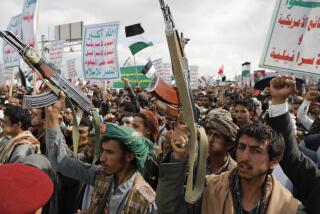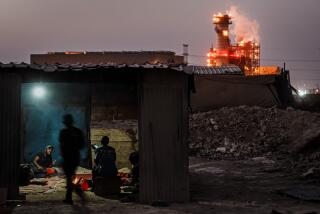Rules in Mideast’s Wild West
- Share via
MARIB, Yemen — When a German engineer was taken hostage in Yemen last November, it made headlines around the world, reinforcing this nation’s image as the Wild West of the Middle East, a place where gangs of armed tribesmen prey on foreigners. It took days of intense negotiations to free him.
But 43 Yemeni hostages held here for months haven’t been so lucky: no international outrage, no local angst, not even a whimper of protest over their captivity. One reason, it seems, for the muted response: The government took its own citizens captive.
That Yemen’s elected leaders resorted to hostage-taking tells much about the obstacles to transforming this battered, fractured and largely tribal society of 18 million people into a modern nation. Taking the law into one’s own hands--even if it’s the government that is doing the taking--has long been a prominent element in Yemen’s tribal-dominated culture.
Tribes thrive in a vast network that spreads north and east of Sana, the capital, and into the barren mountains and golden deserts of the Arabian Peninsula. Much of this region is governed by centuries-old traditions in which tribal sheiks divine justice and routinely take “collateral”--cars, weapons or family members--during negotiations to settle disputes or to force the government to address their needs.
The tribes have become a significant concern for the U.S. government in the wake of an October 2000 attack in Yemen on a U.S. Navy destroyer and the Sept. 11 terrorist assaults. Al Qaeda network operatives have found refuge and support among some Yemeni tribes, offering gifts of cash and cars and playing on tribal codes of honor and vengeance. In some cases, Yemenis became eager recruits to the cause of Islamic fundamentalism, bringing to it their deeply rooted tribalism.
“It is very important to understand the tribal culture,” U.S. Ambassador Edmund Hull said. “We will not succeed unless we do.”
For Westerners, the word tribe conjures up images of a savage and backward people. But the reality is far more complex and subtle.
Tribes here are part of an elaborate social structure that has endured through generations, a system with precise codes of conduct and its own caste-like hierarchy. Tribes flourish where the government is barely a presence and there is often no electricity, no running water, no hospitals and no schools. It is in these desolate rural communities that people learned the tribe is Yemen and Yemen is the tribe.
Most Yemenis trace their lineage to four main tribes. Over centuries, these have fractured into hundreds of minor tribes and clans, each defined as much by geography as by family lines. The tribal structure in southern Yemen, which was a separate country until 12 years ago, was essentially dismantled by that region’s former communist regime.
“The tribal system is a civilized one,” said Sheik Abdelkarim bin Ali Murshed, who leads a minor tribe of about 100,000 centered on the village of Asnaf in the Kholan region of northern Yemen. “It contains noble rules. The vulnerable are protected by the strong. The poor are aided by the rich. The system maintains and preserves human rights.”
Although the government would like to tame the tribes, it recognizes their importance in maintaining stability. Sheiks often are given government positions that allow them access to gratuities and bribes they use to support their communities, several Yemenis said. The tribal system serves as a substitute where few government services, from courts to running water, are provided.
Seven months ago, for example, a fight in the Kholan region over a piece of land led a member of one clan to kill someone from another clan. Hoping to head off growing violence, Sheik Abdel Aziz Ghadir, a local elder, and other regional dignitaries visited the victim’s family, bringing as offerings an ox, goat, sheep and other livestock.
By accepting the animals, the family also accepted that the elders would mediate the dispute. Then Aziz said he took from each family two cars and 20 machine guns as insurance that they would abide by a ruling. Once the verdict is rendered, the cars and guns will be returned.
As this was considered an acceptable killing because both men were armed, the final verdict should require the family of the accused to pay about $4,300, with half going to the victim’s tribe and half to his family. If all sides agree, justice is quickly served, no one goes to jail and the government abides by the outcome.
Sometimes family feuds can drag on for years. In Al Jawf, an impoverished province neighboring Marib, it took 48 years to end a conflict between two tribes that began with the killing of a dog and a camel. Sheik Arfag bin Hathban, a top tribal leader, said that by the time he ended the feud, 32 people had been killed.
“The government doesn’t give us any support,” Bin Hathban said. “People have to depend on the tribe. Most of the problems are handled in the tribe.”
Nominally, Yemen has the trappings of democracy, with an elected president and parliament. But in much of the country, the tribes hold sway. Still, although the tribes might be strong in their regions, those without members in the government often feel neglected.
Desperate for development in their communities or angry over political grievances, they resort to taking hostages to improve their leverage and gain concessions and projects such as roads from the government. In the last five years, about 120 foreigners have been taken captive. As strange as it might seem to outsiders, the government did not uniformly view this as criminal until recently. President Ali Abdullah Saleh has started prosecuting such acts, imposing heavy prison sentences and promising no mercy.
Despite that pledge, Abdul Hadi H. Hamdani, a presidential advisor, said he empathizes with the hostage-takers.
“They don’t kidnap to kill them,” he said. “They keep them as guests to pressure the government to bring the tribe a road or a school. Tribespeople come to Sana [the capital], they see the roads, the cinemas, everybody has a car, and in their village there is nothing. What are they going to do?”
But even when hostages are taken, it is within the context of tribal etiquette and culture. Polish Ambassador Krzysztof Suprowicz was kidnapped in March 2000 from Sana and taken to the Kholan region.
“We arrived at the village, they showed me into the majlis [meeting room] of the sheik’s house,” Suprowicz said, recalling the day he was taken. “The elders arrived. They greeted me, welcomed me. ‘Feel free, you are our guest. Whatever you wish, we will go with you.’ It was very traditional. Once you are the guest, they will die before they let anything happen to you.”
Suprowicz learned firsthand how the world is viewed by many Yemenis.
“For them, their country is Kholan and the neighboring village,” said the ambassador, who was held for four days until tribal leaders negotiated his release. “This is their country. ‘What is Yemen? What is government? Government is not providing for us. Our sheik is providing for us.’ ”
This is the world that U.S. investigators have been trying to better understand since the bombing nearly 18 months ago of the U.S. destroyer Cole in the port of Aden. Seventeen American sailors were killed and 39 injured in the attack, which was blamed on Osama bin Laden’s Al Qaeda network.
It was also this environment that greeted suspected terrorist Mohammed Hamdi Ahdal when he entered Marib, a district so undeveloped that 250,000 of the 300,000 residents do not have electricity.
According to the U.S. government, Ahdal is a senior Al Qaeda operative who moved to a neighborhood in the town of Marib that is controlled by Sheik Ahmed bin Ali Jalal. Ahdal gave money and cars to some residents to win their trust, but the sheik offered sanctuary based on tribal etiquette of helping guests, according to a knowledgeable resident. Some knew of Ahdal’s alleged terrorist links and the fact that he spent hours each night talking on a satellite phone, the resident said.
U.S. officials also suspected that Qaed Salim Sunian Harethi, another alleged Al Qaeda terrorist, was in the region. The resident, who asked to remain anonymous, said that Harethi, who frequently visited and gave cash to Ali Jalal, lived in Al Jawf province. There, he too took advantage of tribal customs: Harethi had family connections to the local tribes, officials said, and was automatically offered protection.
Since Sept. 11, the U.S. has broadened its presence here, with plans to send troops who will train the Yemeni military to root out Al Qaeda members. Part of that campaign came in December, when about 200 Yemeni soldiers entered the impoverished area around Marib, about 75 miles east of the capital. They were hoping to arrest the two suspected Al Qaeda operatives.
When troops entered a neighborhood looking for the men, tribal leaders arranged for them to conduct a search. But members of the tribe grew increasingly angry as soldiers began to confiscate mobile phones, videotapes and documents.
One witness said an airplane passing overhead spooked the anxious residents, who opened fire on the troops. The fight reportedly involved as many as 1,000 local gunmen. The government said 18 soldiers and 14 locals died in the firefight. A tribal official said 25 soldiers died, 40 soldiers were injured and six residents were killed.
With that bloody failure, and with the suspected terrorists still at large, the national government resorted to the time-tested Yemeni approach: It took the 43 hostages, including 10 sons of tribal sheiks, in an effort to force locals to hand over the suspects.
“We are not used to fighting, so we use peaceful and easy means that will keep respect and dignity and at the same time achieve what we want to achieve,” said Sheik Sultan Sayed Barakani, a member of parliament and leader of the majority caucus. “We don’t call them hostages; they are guests.”
In the wake of the bloodletting, tribal chiefs throughout Yemen signed an accord with the government saying they will not harbor terrorists--and any tribal leader who does could be killed with impunity, either by the government or the tribe.
“When the government is weak, the tribes and sheiks will be strong,” said presidential advisor Hamdani, explaining why the administration took a hard line in the case. “They will convince people they are the authority.”
*
Slackman was recently on assignment in Yemen.
More to Read
Sign up for Essential California
The most important California stories and recommendations in your inbox every morning.
You may occasionally receive promotional content from the Los Angeles Times.













